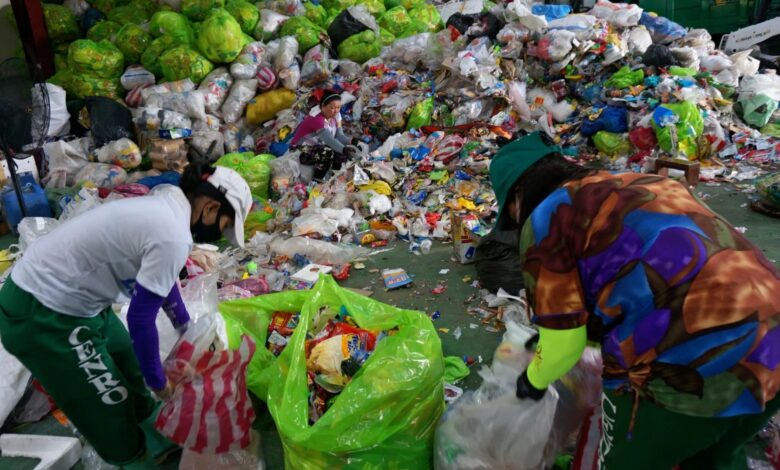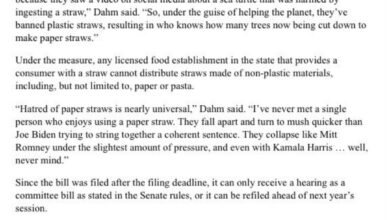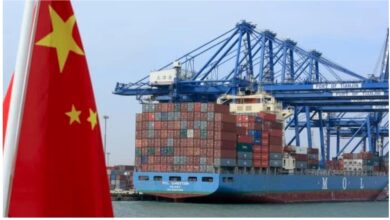U.S. Continues to Ship Illegal Plastic Waste to Developing Countries Updates
PLASTIC WASTE USA

PLASTIC WASTE
A man carries a bucket of plastic waste at an import plastic waste dump in Mojokerto, Indonesia, on December 4, 2018. Ulet Ifansasti / Getty Images
The majority of the world is working together to reverse the massive plastic pollution problem. But, the world’s leading producer of plastic waste, the U.S., hasn’t signed on and isn’t following the rules.
In 2019, 187 countries, except for the U.S. and Haiti, voted to amend the 1989 Basel Convention to include plastic waste in the definition of hazardous materials, and to strictly limit how that trash is traded internationally. The binding framework hoped to make globally traded plastic waste more transparent and better regulated. It went into effect on Jan. 1, 2021.
UN officials hoped the agreement would curb ocean plastic within five years. Supporters believed the convention would level the industry’s global playing field by allowing developing nations such as Vietnam and Malaysia to refuse low-quality and hard-to-recycle plastics before they were shipped from developed nations, a UN transboundary waste chief told The Guardian.
At the start of the year, when the new rules were just being implemented, the fact remained that the U.S. had not agreed to the amendment despite producing most of the world’s plastic waste. Proponents held that the amendment would still apply to the U.S. anytime it tried to trade plastic waste with any of the participating 187 countries, many of which are poor and developing nations, CNN reported.
According to the Basel Action Network (BAN), a nonprofit organization that lobbies against the plastic waste trade, participating nations are prohibited from trading waste with countries that have not ratified the Basel Convention, The Maritime Executive reported. This creates an effective ban on plastic waste trade between the U.S. and most of the world, and makes U.S. plastic export shipments “criminal traffic as soon as the ships get on the high seas,” BAN told The Maritime Executive.
Despite these new rules, U.S. Customs data from January shows that optimism about the convention’s effectiveness may have been premature. According to The New York Times, American exporters continue to ship plastic waste overseas, despite the fact that receiving countries have agreed, per the Basel Convention, not to accept it. In fact, the new report showed that American exports of plastic scrap to poorer countries have barely changed and that overall exports of scrap plastics even rose.
The Times reported that environmental watchdog groups viewed this as evidence that exporters are either ignoring the new rules or following their own interpretations. American companies are justifying waste shipments as being legal even though recipient countries legally can’t accept it. The former is using the logic that because the U.S. never ratified the global ban, the rules don’t apply to originating shipments.
The Maritime Executive also noted that America’s plastic waste shipments will continue to be associated with “uncontrolled dumping” in developing countries, and that much of the plastic waste collected in the U.S. under the guise of recycling actually ends up in overseas landfills and the oceans. In fact, a new Woods Hole study found that the U.S. is likely the world’s third-largest source of ocean plastic, not just because it is the world’s largest producer of plastic waste, but also because recyclables being sent to the developing world are often mishandled and discarded into the ocean.
“This is our first hard evidence that nobody seems to be paying attention to the international law,” Jim Puckett, BAN’s executive director, told The Times regarding the new trade data. “As soon as the shipments get on the high seas, it’s considered illegal trafficking.”
Because of the U.S.’ continued disregard for the rules, it continues to ship illegal plastic waste “[a]nd the rest of the world has to deal with it,” Puckett told The Times.
“You’re starting to see an outcry in countries being flooded with waste. And we are already seeing more countries starting to put their foot down,” David Azoulay told The Times. Azoulay is a Geneva-based lawyer with the Center for International Environmental Law. He added that the more Americans “learn that their waste ends up in fields in Malaysia, or openly burned in Indonesia or Vietnam, it’s not going to sit very well.”




